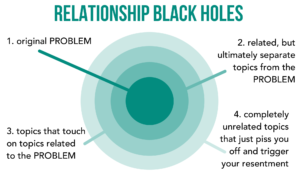Welcome to the last installment in my series about the six types of boundaries. They are:
- Physical Boundaries
- Intellectual Boundaries
- Emotional Boundaries
- Sexual Boundaries
- Material Boundaries
- Time Boundaries
So far, I’ve covered material, sexual, physical, time, and emotional boundaries. Today, I’m focusing in on Intellectual Boundaries: Thoughts and Ideas.
This is the last boundary I’m covering, because it’s the least discussed (or considered) out of all of them, I feel. And yet, we do have boundaries around our thoughts and ideas that we instinctually know, but have never actually acknowledged to ourselves or others, which can cause huge rifts in conversation and communication.
Healthy intellectual boundaries are about understanding where your ideas and thoughts begin and another’s leaves off. Knowing what feels right for you to share about your thoughts in various situations and types of relationships.
For example, when do you speak of a new idea you’ve been toying with, or a project you’re working on? What makes you feel intellectually safe and valued?
Boundary violations occur when someone dismisses or belittles your ideas and presented thoughts. Also, you can violate your own personal boundaries by sharing too much too soon or with the wrong people, and making yourself vulnerable to their attacks, criticisms, and theft.
Here are a few questions to get you started:
- Do you often feel your thoughts and ideas are devalued?
- Do you often feel like you have too much to say in certain situations?
- How do you protect your intellectual boundaries?
- What do you speak about that fills you up?
- Do you enjoy sharing your thoughts with just anyone?
- What thoughts are saved for friends, or for specific conversations?
- How do you know when you have overshared?
- Do you feel like people in your life belittle your thoughts?
- How do you choose when to share difficult ideas or concerns?
- Do you think about the setting of conversations that may be challenging, and plan your approach?
- Do you take care with your words, to present your ideas as clearly as possible?
- Are there conversations or ideas that are triggers for you?
- Do you have a plan to handle triggers as they come up, to protect yourself and others from their fallout?
- Do you feel that you can respect others when they disagree with you?
- Do you feel a need to be respected when you are disagreeing with others?
- Do certain words or phrases send you into an intellectual rage (or tailspin)?
- Do you set time aside in your days to think and hone your intellectual self?
- Do you want or require credit for your ideas when they are shared by others?
- Do you allow your ideas to be shared by others with/without credit?
- What types of intellectual pursuits make you happy?
- Do you prioritize thinking over feeling? Feeling over thinking? Or both, equally?
- How do you let someone know that you will not tolerate the way they speak to you?
- Are there ideas or types of thoughts you do not allow in your life (racism, homophobia, etc.)?
- What do you say to someone who holds ideas you will not allow in your life?
- How do you defend your ethics? To lovers? To friends? To family? To strangers?
- Do you enjoy debates or arguments?
- Do you work to learn intellectually from others, or do you prefer to guard your own thoughts?
- Do you journal your thoughts?
- If so, is that private?
- Are your thoughts and ideas compartmentalized by personal and professional (or other ways), or are they integrated?
- Do you require intellectual conversation from others in your life? How much?
- Do you feel that you have many unexamined thoughts or beliefs that guide your daily life and interactions with others?
- Do you attempt to examine or “unpack” ideas and thoughts when they come up?
- Do you need to agree with the people you love on certain topics?
- Do you need the people you love to agree with you on certain topics?
- Are there thoughts and ideas that are harmful to you?
- Is intellectual discussion a form of love language for you (or the opposite)?
- Is intellectual discussion a turn on for you (or the opposite)?
- Are you willing to have “no go” topics in your relationships that you agree to never discuss?
- Do you have specific religious beliefs that are important to you?
- Is it critical that others share your religious beliefs (or lack of)?
- Do you get uncomfortable when people discuss intimate thoughts in public spaces?
- Do you feel safe to be curious?
- Do you feel good, even when you don’t know an answer?
- Are you able to be wrong: with strangers, with friends, with family, with a partner?
- How do you handle feeling misunderstood?
- How do you handle feeling silenced?
- When someone changes the topic from something that is important to you, how do you react?
- Do you feel that people run over your thoughts often?
- Do you take responsibility for your thoughts and ideas?
- Are your opinions easily swayed by others?
- Are you thoughts about yourself easily influenced by others?
These are a place to start with yourself, and with others in conversation or negotiation as you build relationships.
Many of them focus on getting clear about where to take responsibility for your thoughts and ideas so you can manage and prioritize your conversations without getting overwhelmed, and to note where you might be stepping on other’s boundaries when it come to how they think and communicate those thoughts.
What are your thoughts?
Any of these resonate with you? Can you spot them in yourself? Can you spot some of these boundary issues in others in your life?








